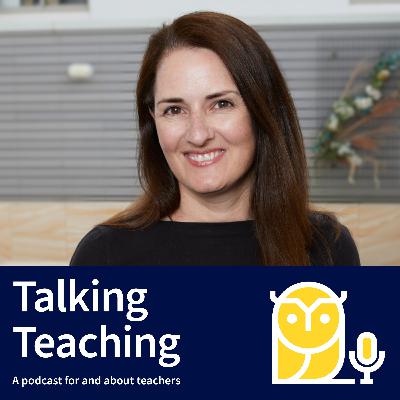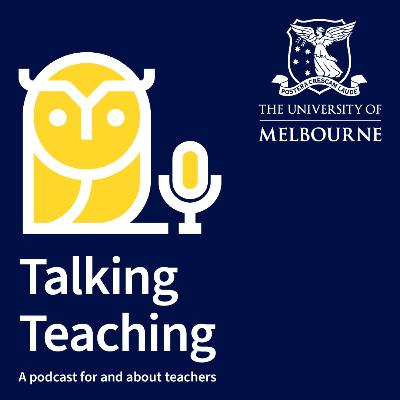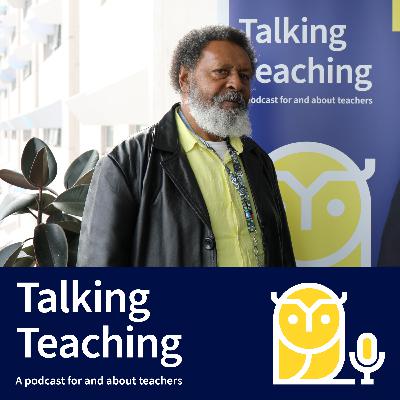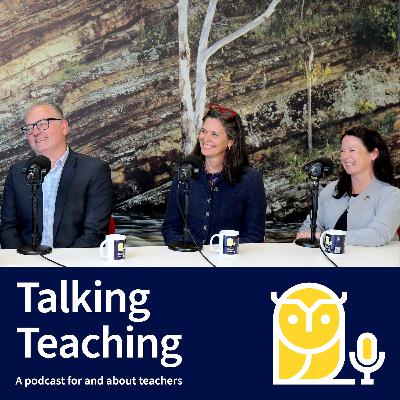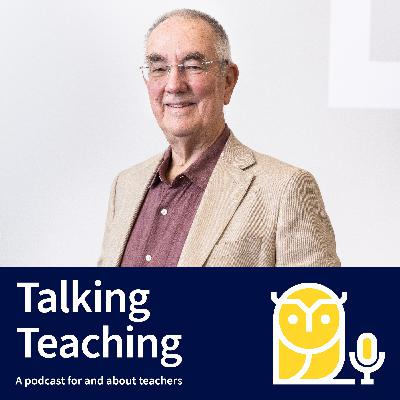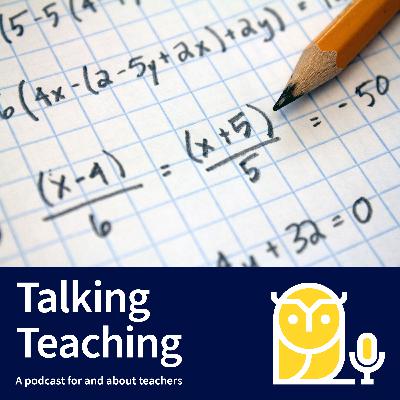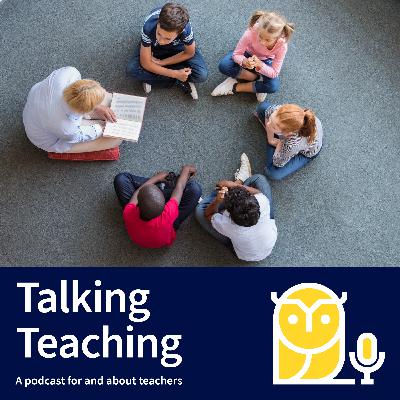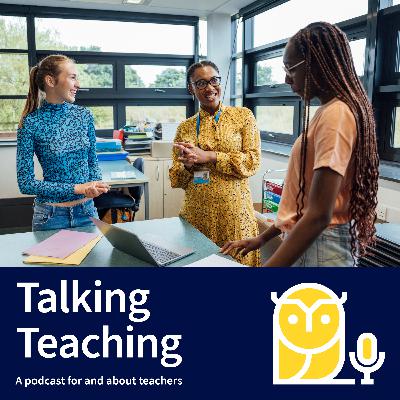Discover Talking Teaching
Talking Teaching

Talking Teaching
Author: University of Melbourne
Subscribed: 478Played: 4,869Subscribe
Share
© University of Melbourne
Description
Talking Teaching is a University of Melbourne podcast about effective, evidence-based classroom practice and the latest in educational thinking. Each episode features insights from world-renowned educators and thinkers.
52 Episodes
Reverse
In this episode of Talking Teaching, Dr Sophie Specjal explores the story of Hester Hornbrook Academy, a fee-free, Independent Special Assistance School (SAS School) in Victoria supporting young people aged 15–25 who have experienced significant barriers to education, including trauma, mental health challenges, family violence, housing instability, or prolonged disengagement from schooling. The episode examines how learning and wellbeing are intentionally designed together to re-engage students and achieve successful outcomes and a sense of belonging. Joining host Sophie Specjal are Sally Lasslett, Executive Principal, and Elida Brereton, board member and long-serving former principal.Together, they unpack what makes SAS schools like Hester Hornbrook distinctive: a healing-oriented approach to education, flexible learning environments shaped by student voice, and a multidisciplinary model that brings wellbeing and learning together without lowering expectations.The conversation explores the realities of re-engaging students who may not yet feel safe in “traditional” schooling, the importance of staff support and supervision in high-complexity settings, and why personalised learning plans and applied learning projects can provide a powerful bridge back to achievement.They also reflect on the sustained national growth of Special Assistance Schools in the diverse Independent School sector over the past decade, discussing why these models have expanded rapidly in response to increasing student complexity and disengagement, and what this means for the future of schooling in Australia.
In this episode of Talking Teaching, Dr Sophie Specjal sits down with Dr Jennifer Buckingham to explore the critical intersection of reading, reasoning, and artificial intelligence in contemporary education.Drawing on decades of research and policy experience, Dr Buckingham explains why reading is far more than decoding words; it is foundational to comprehension, critical thinking, and lifelong learning. The discussion traces the evolution of reading instruction in Australia, highlighting the importance of systematic phonics and evidence-based practice in improving literacy outcomes.The conversation also turns to the challenges faced in secondary schooling when reading difficulties persist, the impact of screen-based reading on comprehension, and what the rise of AI means for literacy, learning, and thinking. Throughout, Sophie and Jennifer discuss the enduring importance of fostering a love of reading, building strong teacher knowledge, and ensuring all students have the opportunity to become confident, capable readers, now and into the future.
What can Indigenous knowledge teach us about raising and educating children? Anishinaabe visiting scholar Professor Jan Hare, from the M’Chigeeng First Nation and Dean of the Faculty of Education at the University of British Columbia, joins host Dr Sophie Specjal to explore how Indigenous principles can guide the way we care for and teach children. Professor Hare shares stories such as The Three Sisters, highlights the role of ceremony and learning with the land, and invites educators to see young children as ‘gifts.’ She also reflects on how these perspectives could help shape policy reforms in Australia.https://education.unimelb.edu.au/talking-teaching
How do we measure what truly matters in education? Laureate Professor Emeritus John Hattie joins host Dr Sophie Specjal to reflect on five decades of research, leadership and global influence. From his pioneering work on Visible Learning to mentoring over 200 PhD students, Hattie explores the mentors, milestones and moments that defined his career, celebrates teacher expertise, and considers how schools can nurture curiosity and belonging. He also looks ahead to how AI may transform classrooms and learning. More information and useful links are available via this link. Talking Teaching is available on Apple Podcasts, Spotify, or wherever you get your podcasts. We’d love to hear your feedback on the series, send your questions, comments or suggestions for future episodes to foe-news@unimelb.edu.au. This podcast is produced by the Faculty of Education, University of Melbourne.
To mark 50 years of NAIDOC Week, Talking Teaching celebrates this year’s theme, The Next Generation: Strength, Vision & Legacy, by spotlighting the work of Dr John Doolah, a proud Torres Strait Islander and Indigenous education lecturer at the University of Melbourne. In conversation with host Dr Sophie Specjal, John reflects on his heritage, his research, and the enduring strength of Indigenous knowledge systems. He shares how Torres Strait Islander ways of knowing can be meaningfully embedded in classrooms through respectful collaboration and cultural understanding, not as an add-on, but as central to learning. This episode invites educators to reflect, learn, and take part in shaping a future that honours both the legacy of Elders and the vision of emerging Indigenous leaders. Dr John Doolah is a proud Torres Strait Islander of Erubam le (Erub person) and Meriam le (Mer person) heritage. John belongs to the sager people of Mer and his Mer nosik (clan) division, is Samsep-Meriam. He is a lecturer in Indigenous Education at the University of Melbourne and a Ngarrngga post-doctoral fellow. Click the episode link for more information and key resources. Talking Teaching is available on Apple Podcasts, Spotify, or wherever you get your podcasts. We’d love to hear your feedback on the series, send your questions, comments or suggestions for future episodes to foe-news@unimelb.edu.au. This podcast is produced by the Faculty of Education, University of Melbourne.
How does language shape how we feel, relate, and learn? In this episode, host Dr. Sophie Specjal is joined by Professor Lindsay Oades, Dr Jacqui Francis and Lisa Baker to explore the emerging concept of Wellbeing Literacy; the capability to intentionally use language to foster wellbeing, including educational settings.Together, they unpack how language can be used not just to communicate, but to regulate emotions, build community, and support learning across all stages. From arts-based programs in the Goulburn Valley to play-based learning in early years, this conversation highlights the real-world potential of integrating Wellbeing Literacy into everyday educational practice. Professor Lindsay Oades is the Deputy Dean of the Faculty of Education, Dr Jacqui Francis is a Lecturer at the Centre for Wellbeing Science and Lisa Baker is a Project Officer at the REEaCh Centre. Click the episode link for more information and key resources. Talking Teaching is available on Apple Podcasts, Spotify, or wherever you get your podcasts. We’d love to hear your feedback on the series, send your questions, comments or suggestions for future episodes to foe-news@unimelb.edu.au. This podcast is produced by the Faculty of Education, University of Melbourne.
What if learning isn’t just about what we know, but about who we become? Professor Guy Claxton joins Talking Teaching to unpack his fascinating journey through psychology and education, and discusses learning as a capacity, calling for a balance between explanation and exploration in teaching. In this episode, Professor Claxton together with our host, Dr Sophie Specjal, unpacks his critique of oversimplified teaching models and the central ideas behind his new book, Bodies of Learning. Professor Claxton reflects on the importance of integrating explicit instruction with inquiry, and highlights the role of embodiment, including movement and gesture, in deepening student understanding. Guy Claxton is an Emeritus Professor of the Learning Sciences at Winchester’s Centre for Real-World Learning and an Honorary Senior Research Fellow at the University of Bristol. Click the episode link for more information and key resources. Talking Teaching is available on Apple Podcasts, Spotify, or wherever you get your podcasts. We’d love to hear your feedback on the series, send your questions, comments or suggestions for future episodes to foe-news@unimelb.edu.au. This podcast is produced by the Faculty of Education, University of Melbourne.
Talking Teaching is joined by distinguished guests Professor Jim Watterston, Dean of the Faculty of Education, and Professor Yong Zhao, Foundation Distinguished Professor at the University of Kansas. Together, they discuss their recent co-authored book, 'Focused: Understanding, Negotiating, and Maximizing Your Influence as a School Leader,' offering a practical guide to educational leadership. From navigating challenges to enhancing student engagement, Watterston and Zhao provide strategic advice grounded in research and experience.Talking Teaching is available on Apple Podcasts, Spotify, or wherever you get your podcasts. We’d love to hear your feedback on the series, send your questions, comments or suggestions for future episodes to foe-news@unimelb.edu.au. This podcast is produced by the Faculty of Education, University of Melbourne.
In a world abundant with content, how can we harness literary education as a form of social change? How can we re-invigorate schools to be spaces to engage with uncomfortable truths and delicate subject matter in a respectful way?In this episode, Faculty of Education Deputy Dean and co-founder of the Literary Education Lab, Professor Larissa Mclean Davies, and English teacher and PhD candidate, Allayne Horton, help us uncover the vibrant world of literary education and explore how schools and teachers can effectively engage with texts to mould future perspectives.Talking Teaching is available on Apple Podcasts, Spotify, or wherever you get your podcasts. We’d love to hear your feedback on the series, send your questions, comments or suggestions for future episodes to foe-news@unimelb.edu.au. This podcast is produced by the Faculty of Education, University of Melbourne.
In this episode, we are joined by two experts, to discuss the Nation School Reform Agreement, currently up for renegotiation. This joint agreement between the Commonwealth, states and territories is designed to lift student outcomes in Australian schools and plays a pivotal role in school funding and addressing equity in education. Prof. Pasi Sahlberg and A/Prof. Glenn Savage, both influential in Australian educational policy, help us explore the future of the Agreement, its implications for teachers, and what we can hope for when deliberation concludes in December 2024.
In this episode, we learn how to bolster both climate and sustainability literacy, and support climate action in the classroom. Listeners will discover how we can empower students to not only understand the science but also engage in meaningful conversations about our changing planet. We explore how teachers can create safe spaces for students to process their feelings about climate change and how schools are implementing sustainable practices, fostering a sense of agency and hope.
We speak with three academics from the Faculty of Education: Professor Marcia McKenzie, the Associate Dean (Sustainability) and Director of the MECCE Project, as well as Associate Professor Kate Coleman and Dr. Sarah Healy, the co-directors of the Speculative Wanderings in Space and Place (SWISP) Lab. Additionally, Jenny Williams, Principal of Firbank Grammar, shares insights from a school perspective.
In this episode, we delve into the future of education in Australia, exploring ideas to reimagine the purpose of schools by shifting the focus from academic achievement to whole-child development, paving the way for healthier, more equitable futures for all students.
With insights from experts A/Prof, Jon Quach from the Faculty of Education at the University of Melbourne and Prof. Sharon Goldfeld from Centre for Community Child Health at the Royal Children’s Hospital, along with educators Erin Brass from St. Ambrose Parish School and Karlie Price from St. Peters Primary School, we'll discuss the importance of equally prioritising health and wellbeing with academic achievement within Australian schools.
In this episode, we delve into the stories of three remarkable Indigenous women significantly impacting the educational landscape across Australia.
From overcoming challenges to integrating Aboriginal and Torres Strait Islander cultures and knowledges into curriculums, our guests share their wisdom and expertise, providing valuable lessons for anyone passionate about education.
Listeners gain insights into their experiences, achievements, and the transformative work they are doing in their communities, highlighting the importance of Indigenous voices in shaping educational policies, practices, and outcomes.
For more information visit https://go.unimelb.edu.au/p4ys
Artificial Intelligence or AI has well and truly arrived. As ChatGPT and DALL-E become mainstream, warnings in the media about this new technology are growing, including its impact on education and assessment. But AI also offers exciting opportunities to enhance learning, think creatively, alleviate workloads and embrace inclusivity. In this episode we de-mystify the question; is AI in the classroom a friend or a foe?
Helping us explore this evolving conundrum and share the inspiring possibilities of new tech and tips on how teachers can start exploring AI in their classrooms is prolific educator and researcher and Foundation Distinguished Professor in the School of Education at the University of Kansas and a professor in Educational Leadership at the Melbourne Graduate School of Education , Professor Yong Zhao, as well as expert in self-regulation and classroom-based assessment and Director of the Assessment and Evaluation Research Centre, Professor Therese Hopfenbeck, and expert in technology in the classroom and Director of Curriculum at the Victorian Curriculum and Assessment Authority, Lauren Sayer.
Discover the complex issues around school attendance that can adversely affect students, teachers and parents.
The media have referred to it as school ‘refusal’ but student attendance is an old problem in the new post COVID lockdown era.
Hear out host, Dr Sophie Specjal speak with clinical psychologist, Associate Professor Glenn Melvin who shares research and expertise with student anxieties. Discover practical insights from Katie Archibald and Rebecca Plunkett discuss how they are working with at risk students in improving their school attendance at the Travancore school. Explore the big picture of school attendance measurement and its national issues from Associate Professor Lisa McKay Brown who shares research, expertise and support for the complexity of school attendance.
In this episode of Talking Teaching, Professor Jim Watterston, Dean of the Melbourne Graduate School of Education (MGSE), delves into the details of Australia's teacher crisis. How does the situation differ in rural and urban areas? Is teacher education a problem? Why can't we fast-track people from other jobs into teaching? Why are teachers leaving the profession at a crisis level? What are some solutions for the teaching profession?
The use of digital education and artificial intelligence is rapidly becoming the new norm. In this episode, we are joined by Carlo Perrotta, an Associate Professor of Digital Education, and Dr. Matthew Fyfield, Deputy Principal of Mazenod College, who explore the intricate world of educational technology and its impact on teaching and learning. Together, they tackle ethical concerns, pedagogical responsibility, and the need for clarity in understanding digital tools, while envisioning what this all means for teachers.Talking Teaching is available on Apple Podcasts, Spotify, or wherever you get your podcasts. We’d love to hear your feedback on the series, send your questions, comments or suggestions for future episodes to foe-news@unimelb.edu.au. This podcast is produced by the Faculty of Education, University of Melbourne.
As artificial intelligence becomes more integrated into schools, what does it mean for the way we plan lessons, support students, and teach mathematics? Dr Sophie Specjal explores the evolving role of AI in education with Dr Scott Cameron, Dr Carmel Mesiti, and Mr Luke Clift. They discuss the use of tools like ChatGPT in lesson planning, the impact on teacher workload, and how AI might support, or hinder, student engagement. Drawing on research and classroom practice, the guests unpack the variability of AI-generated content, the need for critical reflection, and the ethical considerations of AI in schools.Dr Scott Cameron is a Lecturer in Mathematics Education at the Faculty of Education with an interest in using technology and AI to support teaching and learning.Dr Carmel Mesiti is a Senior Lecturer at the Faculty of Education and expert in mathematics pedagogies for both primary and secondary education.Mr Luke Clift is a practicing teacher at Kardinia International College, trialling AI in lesson planning and its use and impact in the classroom.More information and useful links are available via this link.Talking Teaching is available on Apple Podcasts, Spotify, or wherever you get your podcasts. We’d love to hear your feedback on the series, send your questions, comments or suggestions for future episodes to foe-news@unimelb.edu.au. This podcast is produced by the Faculty of Education, University of Melbourne.
Renowned educator Professor Gert Biesta joins Talking Teaching to explore the deeper purpose of education beyond knowledge transfer. In this episode, Professor Biesta reflects on his journey from post-war Rotterdam to his influential academic career and introduces his three key dimensions of learning: qualification, socialisation, and subjectification. Together, they discuss the role of teachers in fostering student agency, the importance of high expectations, and the idea of world-centred education in an age of complexity. Gert Biesta is a Professor of Public Education in the Centre for Public Education and Pedagogy, Maynooth University, and Professor of Educational Theory and Pedagogy at the Moray House School of Education and Sport, University of Edinburgh.More information and useful links are available via this link. Talking Teaching is available on Apple Podcasts, Spotify, or wherever you get your podcasts. We’d love to hear your feedback on the series, send your questions, comments or suggestions for future episodes to foe-news@unimelb.edu.au. This podcast is produced by the Faculty of Education, University of Melbourne.
What does effective curriculum design look like in today’s classrooms? And how can planning approaches support both student engagement and teacher agency? Dr Sophie Specjal speaks with Auburn South Primary School’s Rhian ap Rees and Darien Hunte, along with Professor John Quay from the University of Melbourne’s Faculty of Education. They explore a framework developed by Professor Quay that combines backward design with inquiry-based learning, and share practical examples of how creative, collaborative planning is making a difference in the classroom. John Quay is a Professor at the University of Melbourne’s Faculty of Education.Rhian ap Rees is Assistant Principal at Auburn South Primary School.Darien Hunte teaches Year 4 at Auburn South Primary School. More information and useful links are available via this link.Talking Teaching is available on Apple Podcasts, Spotify, or wherever you get your podcasts. We’d love to hear your feedback on the series, send your questions, comments or suggestions for future episodes to foe-news@unimelb.edu.au. This podcast is produced by the Faculty of Education, University of Melbourne.



